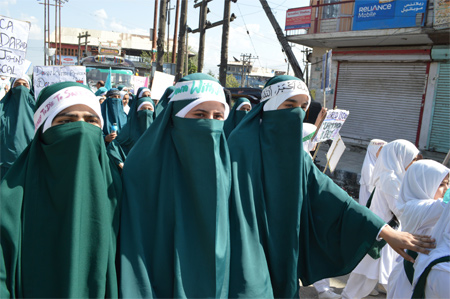by R S Gull
Ever since its transition to Islam, Kashmir has remained very sensitive toward what is being talked about its faith. One of the most impressive instances is the decision of Srinagar not to have prayers in Pathar Masjid in the old city. The reason: when the Mughal queen enquired about the costs that went into the construction of the mosque she was funding, she reacted that it (costs) was much less than the cost of her sandals. The prayers were started in the impressively great mosque a few years before 1947.
For many hundred years, they remained oppressed to a level that they failed to even prevent Jamia Masjid of Srinagar being temporarily being converted into a warehouse. But usually, they resisted every effort that was aimed at their faith. Ruled by despots, autocrats and rajas from different faiths, they ensured one thing generally – to work and ensure the clergy remain with the rulers, at all costs. In absence of knowledge or a formal opposition, the only cliche that had the following and some leadership role was the clergy.
It was this historic phenomenon of politics and faith not possible to separate that led to the emergence of a political movement slightly superimposed on the infrastructure of faith in Kashmir. The use of mosques and shrine as the political outposts against the monarchy created political leadership that had a religious influence. The construction of the modern Hazratbal shrine was the expression of that phenomenon targeted at having a single platform for both – faith and politics. The use of mosques and shrines by the separatist is continuation, if not revival, of that tradition.
In wake of massive disturbances over a mad man’s bad film that mocks at Islam across the Muslim world including the Valley, Kashmir Life offers a select chronology of some events in recent and distant past indicating the severity of reaction to instances of blasphemy and desecration in the valley. Some of these incidents had political fallout as well.
APRIL 29, 1931
It was Eid and in Jammu Eidgah when Imam-e-Hai was in delivering Khutba a Dogra solder directed Imam to stop mistaking it as a speech against Maharaja. He did not know Khutba on Eid follows Nimaz, a complete reversal of what happens on Friday. It triggered massive unrest and within a few days in Jammu police lines a Dogra police head constable Labha Ram desecrated the Quran amid allegations of preventing Muslims from offering prayer in the Jammu periphery. This crisis brought Muslim of Jammu & Kashmir closer to fight autocracy.
JUNE 7, 1937
Pandit Shiv Narain Fotedar while making a speech to Pandits at Shetalnath (Haba Kadal) uttered certain words which were disrespectful to the faith of the Muslims. A severe law and order problem forced Fotedar to apologize and request the resistance leaders to accompany him from place to place so that he apologizes everywhere.
DECEMBER 26, 1963
The holy relic was found missing from the Hazratbal shrine and Kashmir froze literally with no end to the procession. It was finally traced January 4, 1964. By then, however, the BBC (Bakhshi Brothers Corporation) regime had collapsed and Sheikh Abdullah was out of jail.
MAY 21, 1973
A student in Islamabad’s state-run degree college traced the ‘book of knowledge’ that carried blasphemous passage. The book was banned but it did not help the situation to improve. Educational institutions remained closed for nearly half a year.
1989
One person was killed and dozens were injured against massive protest against Salman Rushdi’s Satanic Verses. The protests revived in June 2007 when the UK bestowed the controversial author with the knighthood.
APRIL 19, 1993
Six students were killed when they protested demanding a halt in the telecast of DD tele-serial Bible Ki Kahaniyan. Later, a militant outfit Jamiat-ul-Mujahideen took over and it would set afire SRTC buses in protest against the serial. A total of 170 buses owned by the state-run transport corporation were destroyed in a few months.
OCTOBER 22, 1993
Against the siege of Hazratbal shrine, a procession of locals came out that BSF 7 Bn opened fire upon killing 41 of them as 73 survived injured.
MARCH 30, 1994
Police mowed down 32 activists of JKLF (Amanullah Khan faction) led by Shabir Sidiqui after they were convinced that the gang – otherwise tasked to guard the shrine, had fiddled with the sanctum sanctorum.
OCTOBER 10, 2000
Police fought pitched battles with old city mobs protesting the “mysterious disappearance” of a holy relic from a fourteenth-century shrine of Hazrat Abdul Rehman Bulbulshah Turkistani. Chief Minister had to fly back cutting short a Delhi visit.
















